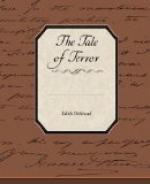“Whose form of giant mould
No mortal eye can fixed behold,”
Mejnour and Zanoni are supposed to have been initiated—the former in old age, the latter in youth—more than five thousand years before the story opens. Thus Mejnour remains for ever a vigorous old man; while Zanoni, his pupil, enjoys perpetual youth. Mejnour is purely intellectual, and spends his life in contemplation; while Zanoni, though he must avoid love and friendship which are unknown to the passionless Intelligences, feels sympathy with human beings.
Zanoni, who spends his life in the pursuit of pleasure, after fifty centuries at last falls in love with Viola, an Italian opera-singer. Like Melmoth the Wanderer, Zanoni is reluctant to bind the woman he loves to his own fate. He tries to renounce Viola to an Englishman, Glyndon, who eventually chooses to relinquish love for the sake of achieving the unearthly knowledge of Mejnour. Glyndon, however, fails in the trial, and is consequently haunted by the horror of the Dweller of the Threshold. Meanwhile Zanoni is united to Viola; and because he has succumbed to the force of love, his peculiar powers begin to fail. He can no longer see the beautiful, aerial intelligence, Adon-Ai. To save from death Viola and the child who is born to them, Zanoni ere long yields to the Dweller of the Threshold his gift of communion with the inhabitants of heaven. Later Viola, who incidentally typifies Superstition deserting Faith, leaves Zanoni at the call of Glyndon, and in Paris, during the Reign of Terror, is doomed to die. Zanoni invokes the aid of the mysterious Intelligences, and his courage at length brings Adon-Ai again to his side. He wins a day’s reprieve for Viola, and is executed in her stead. The death of Robespierre releases the prisoners, but Viola dies the next day.
The compact between Zanoni and the Dweller of the Threshold is a renovation of the time-worn legend of the bargain with an evil spirit, but Lytton transforms it almost beyond recognition. Zanoni is no criminal. He has attained his secrets through will-power, self-conquest, and the subordination of the flesh to the spirit, and he surrenders his gifts willingly for the sake of another. Both Mejnour and Zanoni disclaim miraculous powers, yet Zanoni is ready to stake his mistress on a cast of the dice, and can cause the death of three sanguinary marauders without stirring from the apartment in which he ordinarily pursues his chemical studies. From such incidents as these it would seem as if Lytton, for the actual craftsmanship of Zanoni, may have gleaned stray hints from the novel of terror; but the spirit and intention of the book are entirely different. Though Lytton expressly declares that his Zanoni is not an allegory, he confesses that it has symbolical meanings. Zanoni is apt to assume the superior pose of a lecturer elucidating an abstruse subject to an unenlightened audience. The impression of artifice that the book makes upon us is probably due to the fact that Lytton first conceived his theories and then created personages to illustrate them. His characters have no power to act of their own volition or to do unexpected things, but must move along the lines laid down for them.




